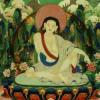Milarepa

Milarepa
UJetsun Milarepais generally considered one of Tibet's most famous yogis and poets. He was a student of Marpa Lotsawa, and a major figure in the history of the Kagyu school of Tibetan Buddhism...
ProfessionPoet
thinking intimate matured
I like to think I have matured since those intimate times in Uruguay.
laughing advice trying
Osho would do mischievous things like sign my name to someone else's question. Or take my question and sign it with someone else's name! Sometimes he would laugh just hearing my name read. At other times, he would appear stern and administer a 'hit'. I could never predict what he was going to do, nor how he would react. Want some advice? Never try to second-guess the master.
rainbow
By late 1989, the Commune was flowering again in all dimensions. Like a rainbow.
moving unpredictable
Life with Osho to me is like a river: always moving, always changing course, always unpredictable.
focus therapy unconscious
As I see it, Pune One was a catharsis phase: a cleansing of our collective unconscious, helped along by the groups and therapies. It was as if Osho was creating a foundation to what would follow. Work came more and more into focus as the Commune, the sangha, grew and flowered.
beautiful country people
When the Ranch finished, there was a big dispersion of energy like a ripe seedpod bursting. The Commune dissolved and his people moved back into the world while he moved from country to country harassed by every government. But Osho had a knack for transforming negative situations and making something beautiful out of them. Hence, many positive things came out the phase he called his World Tour. Ultimately, this phase manifested with him returning to India, where the Commune again flourished reaching yet another peak, the one we know as Pune Two.
creativity meditation vision
Although work was, and still is, considered an important part of Osho's vision, in the last years of his life, he began to emphasize creativity as a way of expressing and sharing the fruits of our meditation.
individual
[Osho] discourses took on more and more the flavor of Zen and it was clear he wanted each of us to become our own individual, not dependent on anybody else. Including him! Nor dependent on anything, even the Commune.
meditation vision care
Taking care of the music around Osho for me has been about allowing things to expand and flow with him, so that the music reflects as clearly as possible his vision and the things we are continually learning by being with him. In this way, music has became my meditation.
gratitude giving joy
[Osho] knows our love arises from very deep feelings of gratitude. He knows we only want to do our best, to give our best to him, all that we are capable of, as this is our joy.
silence
[Osho] silence and love say more than any words.
song beach night
I wrote one of my favorite songs during this time [in India]: Osho, We Your People. The words came to me while I was walking along Juhu Beach one evening - a balmy night under the stars, listening to the soft surf of the Arabian Sea. I hadn't felt so happy and content in a long time.
waiting flight boundaries
I was in England waiting for a flight to India, when I received a message from Shunyo (already in Bombay at this point) that Osho had answered one of my questions during the previous night's discourse. On hearing this, I experienced a love that knows no boundaries, no time.
distance ocean writing
I was in England, Osho was in India - both of us separated by oceans and continents - yet I understood time and distance made no difference in my connection with him. Days later, I arrived in Bombay and was soon at it again, writing fresh questions, and trying to provoke that divine smile. Touché!